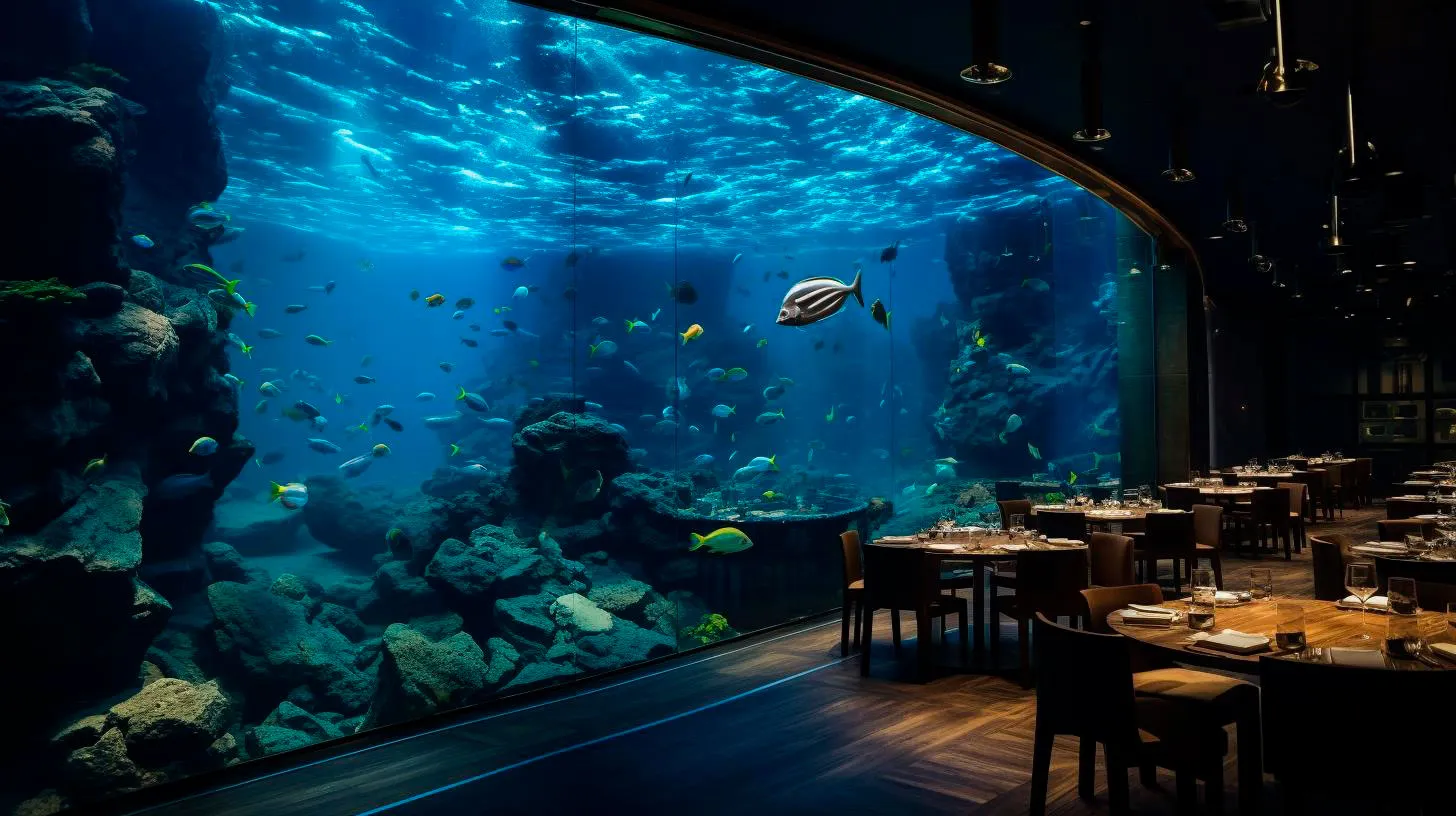The Role of Sushi Restaurants in Supporting Sustainable Fishing Practices
In this article, we will explore the importance of sustainable fishing, why sushi restaurants should prioritize it, and the positive steps they can take towards creating a more sustainable future.
The Importance of Sustainable Fishing
Sustainable fishing refers to the practice of harvesting fish and other seafood in a way that preserves the health of fish populations and their ecosystems. With over 3 billion people depending on seafood as their primary source of protein, it’s imperative to manage our fish stocks responsibly to avoid overfishing and other harmful practices.
- Preservation of Marine Ecosystems: Sustainable fishing practices help maintain the delicate balance of marine ecosystems, preventing the collapse of fish populations and the disruption of food chains.
- Conserving Biodiversity: By avoiding the excessive exploitation of certain fish species, sustainable fishing allows for the preservation of biodiversity in our oceans.
- Mitigating Environmental Impact: Sustainable fishing methods prioritize reducing bycatch and habitat destruction, thus minimizing negative impacts on non-target species and their habitats.
Why Sushi Restaurants Should Prioritize Sustainable Fishing
As sushi restaurants continue to grow in popularity, their impact on the environment becomes increasingly significant. By prioritizing sustainable fishing, these establishments can not only make a positive difference but also set an example for other industries and consumers. Here’s why sushi restaurants should consider supporting sustainable fishing practices:
- Catering to Ethical Consumers: With a growing awareness of environmental issues, consumers now prioritize sustainability when making dining choices. By sourcing their seafood responsibly, sushi restaurants can attract and retain ethically conscious customers.
- Future-Proofing the Industry: By practicing sustainable fishing, sushi restaurants contribute to the long-term availability of their key ingredients and ensure the longevity of their industry.
- Protecting Reputation: Supporting sustainable fishing practices helps sushi restaurants build a positive reputation as socially responsible businesses, enhancing customer loyalty and brand image.
Positive Steps Sushi Restaurants Can Take
So, what can sushi restaurants do to support sustainable fishing practices? Here are some key steps they can take:
- Source Responsibly: Sushi restaurants should prioritize sourcing their seafood from suppliers that follow sustainable fishing practices. This ensures that the fish and seafood they serve are caught or farmed responsibly.
- Educate Customers: Sushi restaurants can play a vital role in raising awareness among their customers. Providing information about sustainable fishing practices and the importance of making sustainable choices can encourage diners to make more responsible decisions.
- Reduce Food Waste: Implementing measures to reduce food waste can significantly contribute to sustainability efforts. By accurately estimating demand, properly storing ingredients, and creating innovative dishes using lesser-known and underutilized species, sushi restaurants can minimize waste.
- Support Conservation Initiatives: Sushi restaurants can collaborate with organizations dedicated to marine conservation. By committing a percentage of their profits or organizing fundraisers, they can directly contribute to efforts aimed at protecting our oceans.
Key Takeaways
Sushi restaurants play a critical role in supporting sustainable fishing practices and safeguarding the health of our oceans. By prioritizing responsible sourcing, educating customers, reducing food waste, and supporting conservation initiatives, these establishments can make a significant impact on the sustainability of the seafood industry.
As consumers, we also have a role to play. Choosing sushi restaurants that prioritize sustainability and responsible fishing practices allows us to enjoy this delightful cuisine while contributing to a more sustainable future for our oceans and marine life.
Sushi Impact on Sustainable Fisheries
Sushi, with its increasing global demand, has a profound effect on sustainable fishing practices, and it’s essential to understand the implications.
1. The Growing Popularity of Sushi
Sushi has come a long way from being a traditional Japanese delicacy to becoming a global sensation. According to recent statistics, the annual consumption of sushi worldwide has reached over 4 million tons, with the United States alone accounting for 18% of the global sushi market. This surge in popularity has resulted in an increased demand for fish species, creating challenges for sustainable fisheries.
2. Overfishing and its Consequences
Overfishing is one of the most significant threats to our oceans and marine ecosystems. It occurs when fish are harvested at a faster rate than they can reproduce, leading to a decline in their population. With the growth of the sushi industry, certain species, such as bluefin tuna, are being severely overfished. As a result, overfishing disrupts oceanic food chains, affects biodiversity, and threatens the livelihoods of local communities that rely on fishing.
Key Takeaway 1: Diversify Your Sushi Choices
While bluefin tuna is undeniably delicious, it’s important to explore a variety of sustainable sushi options. Many other types of fish, like salmon, mackerel, and sea bass, can offer equally enjoyable flavors while being more environmentally friendly choices. By diversifying your sushi choices, you can support sustainable fishing practices and protect our oceans’ delicate ecosystems.
3. The Role of Sustainable Sourcing
To combat the detrimental effects of overfishing, many sushi restaurants and seafood suppliers are adopting sustainable sourcing practices. These practices ensure that the fish used in sushi are responsibly caught, respecting seasonal fishing limits and avoiding endangered species. Sustainable sourcing also encourages the use of fish farms that adhere to environmentally friendly guidelines.
Key Takeaway 2: Look for Responsible Sushi Establishments
When dining out for sushi, do some research to find sushi restaurants that prioritize sustainable sourcing. Look for establishments that display certifications such as Marine Stewardship Council (MSC) or Aquaculture Stewardship Council (ASC). This way, you can enjoy your sushi guilt-free, knowing that it supports sustainable fishing practices.
4. The Rise of Plant-Based Sushi
As awareness of environmental issues grows, so does the popularity of plant-based diets. This trend has resulted in the emergence of plant-based sushi options that are both delicious and environmentally friendly. From avocado and cucumber rolls to creative combinations of vegetables, plant-based sushi provides an exciting alternative that reduces the pressure on fish populations.
Key Takeaway 3: Embrace Plant-Based Sushi
By incorporating plant-based sushi into your diet, you can contribute to reducing the demand for fish and promote sustainable food choices. Plant-based sushi not only benefits the environment but can also introduce you to unique flavors and creative culinary experiences.
5. Raise Awareness and Encourage Change
As consumers, we have the power to drive change. By raising awareness about the impact of sushi on sustainable fisheries, we can encourage individuals and businesses to make more environmentally responsible choices. Sharing this knowledge through social media, supporting sustainable seafood campaigns, and engaging in conversations about sustainable fishing practices can all make a difference.
Key Takeaway 4: Be a Sustainable Seafood Advocate
Play an active role in promoting sustainable fishing by advocating for responsible seafood choices. Encourage others to join you in supporting sushi establishments that prioritize sustainability, and educate them about the importance of protecting our oceans for future generations.
In conclusion, sushi’s popularity has both positive and negative impacts on sustainable fisheries. While the demand for sushi poses challenges such as overfishing, sustainable sourcing practices and the rise of plant-based options provide solutions. By making informed choices, diversifying our sushi preferences, and advocating for sustainability, we can enjoy this beloved cuisine while safeguarding our precious marine ecosystems.
Sustainable Sushi Consumption: A Key to Preserving Marine Life
To ensure the future of our oceans and the sustainable consumption of sushi, it is crucial for both seafood lovers and sushi restaurants to embrace sustainable practices. In this article, we will explore the importance of sustainable sushi consumption and how it can contribute to preserving marine life for generations to come.
The Threat of Unsustainable Fishing
Overfishing is one of the major threats to marine life. According to the Food and Agriculture Organization (FAO), around 33% of the world’s fish stocks are overfished. This uncontrolled fishing not only depletes fish populations but also disrupts the delicate ecosystems that rely on them. To combat this, sustainable fishing practices and responsible seafood choices are imperative.
Benefits of Sustainable Sushi Consumption
By choosing sustainable sushi, we can make a positive impact on marine life and help maintain the delicate balance of our oceans. Here are some key benefits and features of sustainable sushi consumption:
- Safeguards Marine Ecosystems: Sustainable sushi consumption encourages responsible fishing methods that minimize bycatch, habitat destruction, and overfishing. This ensures the preservation of biodiversity and the overall health of our oceans.
- Supports Local Communities: Sustainable fishing practices often involve local fishermen who rely on the ocean for their livelihood. By choosing sustainable sushi, you support these communities and contribute to the economic well-being of coastal regions.
- Reduces Environmental Impact: The carbon footprint of the sushi industry is significant due to transportation and packaging. However, sustainable sushi restaurants often prioritize locally sourced ingredients, reducing the environmental impact associated with long-distance transportation.
- Ensures Food Security: Sustainable fishing practices help maintain the availability of fish stocks for future generations. By consuming sustainable sushi, you contribute to preserving the availability of this valuable food source and ensuring food security.
Key Takeaways for Sustainable Sushi Consumption
To make a sustainable choice when enjoying sushi, keep these key takeaways in mind:
- Choose Sustainable Seafood: Look for seafood labeled as sustainable or consult sustainable seafood guides available online or in mobile apps.
- Support Sustainable Sushi Restaurants: Seek out restaurants that prioritize sustainable seafood sourcing and eco-friendly practices.
- Opt for Locally Sourced Ingredients: By choosing sushi made with locally sourced ingredients, you reduce the environmental impact associated with long-distance transportation.
- Explore Sustainable Sushi Alternatives: Consider trying sushi made from plant-based ingredients or sustainable seafood substitutes.
- Spread Awareness: Share your knowledge with friends, family, and sushi enthusiasts to promote sustainable consumption practices and encourage others to make informed choices.
In conclusion, sustainable sushi consumption is crucial for preserving marine life and ensuring the long-term health of our oceans. By choosing sustainable options, supporting local communities, and being mindful of our choices, we can enjoy this beloved delicacy while safeguarding the future of our oceans. Let’s join hands in making sustainable sushi a norm and take our first step toward a more responsible and eco-friendly future.
How Sushi Can Help Protect Ocean Ecosystems
In this article, we explore how sushi can help protect ocean ecosystems and ensure a sustainable future for our oceans.
The Problem with Overfishing
Overfishing is a major concern when it comes to the sustainability of our ocean ecosystems. The demand for seafood, especially for popular sushi ingredients like tuna and salmon, has led to the depletion of fish populations. This has serious consequences for the delicate balance of marine life and can ultimately lead to the collapse of entire ecosystems.
- Overfishing has caused a significant decline in global fish populations
- According to the United Nations, over 30% of the world’s fish stocks are currently being overexploited
- Popular sushi ingredients like bluefin tuna are highly endangered and facing the risk of extinction
Sustainable Seafood and Sushi
Fortunately, there is a solution to this problem – sustainable seafood. As consumers, we have the power to make a difference by choosing sustainable sushi options. Sustainable sushi refers to seafood that is caught or farmed using methods that minimize harm to the environment and maintain healthy fish populations.
Here are some key factors to consider when choosing sustainable sushi:
- 1. Know the source: Opt for sushi establishments that prioritize transparency and provide information about the source of their seafood. Look for restaurants that partner with sustainable seafood suppliers.
- 2. Choose responsible fishing methods: Some fishing methods, such as longlining or bottom trawling, can cause significant damage to the ocean floor and result in high levels of bycatch. Look for sushi that is made using hook and line or pole and troll methods, which are more environmentally friendly.
- 3. Support local and seasonal: Choosing sushi made from locally sourced seafood reduces carbon emissions associated with transportation and supports local fishing communities.
The Advantages of Sustainable Sushi
By choosing sustainable sushi, we can enjoy a variety of benefits:
- 1. Conservation of marine ecosystems: Sustainable fishing methods help protect marine habitats and preserve the delicate balance of ocean ecosystems.
- 2. Support for local communities: By supporting local and responsible fishing practices, we contribute to the economic well-being of fishing communities.
- 3. Healthier food choices: Sustainable seafood is often fresher and free from harmful chemicals and antibiotics, making it a healthier choice for consumers.
- 4. Promote fish repopulation: By choosing sustainable sushi, we encourage fisheries to adopt sustainable practices and contribute to the recovery of fish populations.
The Key Takeaway
Sushi lovers have an opportunity to make a difference and protect our ocean ecosystems. By choosing sustainable sushi options, we can promote responsible fishing practices, support local economies, and preserve the rich biodiversity of our oceans. With increasing awareness and demand for sustainable seafood, we can ensure a healthy and thriving ocean ecosystem for generations to come.



